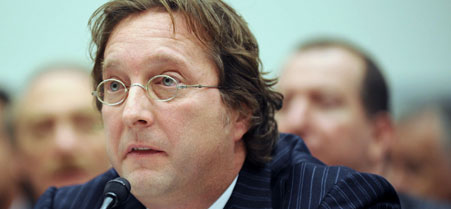LightSquared owner pitches network directly to FCC staffers
The broadband carrier is trying to resolve concerns that its service interferes with navigation receivers.
 Philip Falcone, billionaire CEO of Harbinger Capital Partners, has a lot riding on LightSquared's success.
Philip Falcone, billionaire CEO of Harbinger Capital Partners, has a lot riding on LightSquared's success.
Philip Falcone, the billionaire chief executive officer of Harbinger Capital Partners, which owns the beleaguered startup wireless broadband carrier LightSquared, personally made a pitch to top Federal Communications Commission staffers last week to approve commercial service over the company's network, which could blanket the country with 40,000 cell towers.
When FCC granted LightSquared a conditional waiver to start service on Jan. 26, 2011, it said the company first needed to resolve interference issues with Global Positioning System receivers, which operate in a frequency band adjacent to LightSquared's.
LightSquared last spring flunked the first round of tests, which revealed the company's transmitters knocked out GPS receivers operating anywhere from 600 feet to 185 miles from its transmitters. The company then proposed to use only the lower portion of its frequency band furthest away from the GPS and conducted another round of interference tests last summer.
The Defense and Transportation departments, along with the multiagency Positioning, Navigation and Timing Executive Committee, reported in December that the latest round of tests showed LightSquared transmitters caused "harmful interference to the majority" of general purpose GPS receivers used in those tests. The Federal Aviation Administration also reported that LightSquared transmitters caused interference with the Enhanced Ground Proximity Warning System , which alerts pilots if they fly too close to the ground.
Falcone, along with Jeffrey Carlisle, executive vice president for regulatory affairs at LightSquared, and Ashley Durmer, a consultant to Harbinger, met with top FCC officials on Jan. 4 to address the interference issues, according to a filing posted yesterday on FCC's LightSquared regulatory proceedings website.
The company executives met with Edward Lazarus, chief of staff to FCC chairman Julius Genachowski; Amy Levine, special counsel and legal adviser to the chairman; and Paul de Sa, chief of FCC's Office of Strategic Planning and Policy Analysis. Falcone and Carlisle, according to the filing, "urged the commission to continue to work toward a resolution that would enable the commencement of commercial service over the LightSquared network." They also emphasized the "significant investment" made in LightSquared -- $3 billion to date.
The executives told FCC that LightSquared has "invested millions of dollars during the past 12 months in conducting tests and developing filtering solutions to resolve issues with GPS receiver design that causes devices to look into spectrum licensed to LightSquared. As a result, the scope of the GPS technical issues has been narrowed considerably."
Falcone and Carlisle also discussed with FCC "various alternative technical solutions that will effectively and economically allow GPS receivers to work as intended, and still allow the deployment of the LightSquared network."
LightSquared faces another potential roadblock to the startup of its network: Language in the 2012 National Defense Authorization Act , signed by President Obama on Jan. 1, requires FCC to notify Congress of its decision to allow LightSquared to operate and how GPS interference issues have been resolved.
The law also requires the secretary of Defense to report to Congress every 90 days for next two years on interference to military GPS receivers and the costs to mitigate that interference.
Chis Stern, a LightSquared spokesman, said in an email that "the NDAA language does not change the current review process, which the FCC put in place a year ago when it granted its original waiver to LightSquared. At that time, the FCC said it would not move forward until the GPS interference issue is resolved. The FCC still retains full jurisdiction over the issue although the NDAA does direct the Defense Department to make a report to Congress if it has concerns about interference."
NEXT STORY: Your Average Vet is Not a Whacko Rambo






